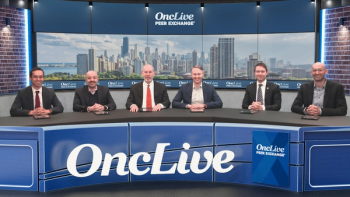
Panelists discuss future perspectives on the role of menin inhibitors in the treatment of acute lymphoblastic leukemia (AML), exploring potential advancements and clinical implications.

Your AI-Trained Oncology Knowledge Connection!


Panelists discuss future perspectives on the role of menin inhibitors in the treatment of acute lymphoblastic leukemia (AML), exploring potential advancements and clinical implications.

Panelists discuss preclinical findings on the potential role of menin inhibitors in relapsed/refractory T-cell acute lymphoblastic leukemia (R/R T-ALL), the implications of p-MEF2C as a biomarker for reshaping the therapeutic landscape and integrating menin inhibitors such as revumenib into clinical practice, and what they anticipate learning from the upcoming presentation on menin inhibitor resistance, highlighting the role of MEN1 mutations in guiding treatment sequencing for MI-resistant acute leukemias.
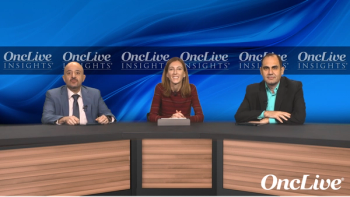
Panelists discuss how the future treatment landscape for myelodysplastic syndromes (MDS) appears promising with several ongoing clinical trials exploring novel combinations and targeted therapies, including investigations of venetoclax combinations, magrolimab, sabatolimab, and other immune-based approaches that could potentially improve outcomes across different risk groups and molecular subtypes.

Panelists discuss how treatment strategies for myelodysplastic syndromes (MDS) are fundamentally guided by risk stratification, with lower-risk patients typically receiving supportive care and less intensive treatments focused on quality of life and symptom management while intermediate- to high-risk patients require more aggressive approaches, including hypomethylating agents and consideration for stem cell transplantation, with emerging data supporting novel combinations and targeted therapies across the risk spectrum.

Panelists discuss the interim phase 1a results from KOMET-007 in newly diagnosed NPM1-mutated or KMT2A-rearranged AML, the potential role of ziftomenib combined with 7 plus 3 chemotherapy in standard induction therapy for high-risk acute monocytic leukemia (AML) patients with these mutations, preclinical findings on the combination of ziftomenib and selinexor in NPM1-mutant AML, and the mechanistic synergy between these therapies, exploring their potential in clinical practice and across other AML subtypes.

Panelists discuss the importance of genetic testing, particularly for KMT2A and NPM1 mutations, in identifying patients who would benefit from revumenib, the role of molecular profiling in identifying high-risk acute monocytic leukemia (AML) patients, approaches to KMT2A testing, and when to recommend RNA over DNA testing, along with guidance for institutions lacking standardized diagnostic testing protocols.

Panelists discuss how oral decitabine/cedazuridine demonstrated meaningful clinical activity in patients with TP53-mutated myelodysplastic syndromes (MDS), with a 31% complete response rate and 16.1-month median overall survival, representing an important treatment advance for this traditionally poor-prognosis molecular subgroup.

Panelists discuss how oral decitabine/cedazuridine showed encouraging efficacy in patients with myelodysplastic syndromes (MDS) with TP53 mutations, suggesting this oral formulation could be particularly beneficial for this historically difficult-to-treat molecular subgroup.

Panelists discuss key findings from the phase I/II study of the all-oral SAVE combination with revumenib in relapsed/refractory acute monocytic leukemia (R/R AML), the impact of the regimen's success in achieving high response and MRD negativity rates on integrating all-oral therapies into the treatment paradigm for R/R AML, particularly in patients with prior venetoclax or transplant exposure, and the potential role of revumenib in current treatment paradigms for R/R AML.

Panelists discuss the role of minimal residual disease (MRD) testing in acute monocytic leukemia (AML), key findings from the Australasian Leukaemia and Lymphoma Group (ALLG) AMLM26 INTERCEPT study on revumenib, and how the efficacy of revumenib in achieving MRD negativity in NPM1-mutated AML informs future MRD-guided treatment strategies, including the potential integration of menin inhibitors into standard AML relapse prevention protocols.

Panelists discuss how the ASCERTAIN trial demonstrated that oral decitabine plus cedazuridine provided comparable efficacy to injectable decitabine.

Panelists discuss how hypomethylating agents remain the cornerstone of therapy for intermediate to high-risk patients with myelodysplastic syndromes (MDS).

Panelists discuss the most commonly seen adverse effects (AEs) in menin inhibitor treatment, strategies for managing and mitigating these AEs to optimize outcomes, and how they compare across approved and pipeline menin inhibitors, along with best practices for clinicians to manage differentiation syndrome, a critical safety concern.

Panelists discuss the data updates from the AUGMENT-101 trial, the potential of revumenib to reshape the treatment landscape for patients with heavily pretreated KMT2A-rearranged acute leukemia, including its observed objective response rate (ORR) and complete remission (CR)/ CR with partial recovery of peripheral blood counts (CRh) rate, and the clinical implications of revumenib in the context of bridging to stem cell transplantation.

Panelists discuss how the primary therapeutic goals for patients with intermediate- to high-risk myelodysplastic syndromes (MDS) focus on extending survival and modifying disease course through intensive treatments like hypomethylating agents or stem cell transplantation while addressing unique challenges such as treatment resistance, poor response durability, and limited options after hypomethylating agents failure.

Panelists discuss the FDA approval of revumenib for relapsed/refractory acute leukemia (R/R AML) with KMT2A translocation, reviewing the eligible patient population and the mechanism of action of this menin inhibitor, while exploring key findings from the AUGMENT-101 trial and how this approval may impact treatment approaches in both the R/R and broader AML settings.

Panelists discuss how treatment goals in the second- and third-line settings for relapsed/refractory acute monocytic leukemia (R/R AML) now focus more on disease control, quality of life, and prolonging survival, and explore the most significant unmet needs in R/R AML, particularly in addressing drug resistance and optimizing therapeutic strategies.

Panelists discuss how achieving responses with second-line treatment options after venetoclax-based regimens remains challenging, and explore strategies for bridging therapy to allogeneic hematopoietic stem cell transplantation (allo-HSCT) in patients who relapse post venetoclax while also addressing the evolving management of patients following transplant.

The panelists discuss the newest risk stratification tool, IPSS-M.

Panelists discuss how the latest NCCN guidelines for relapsed/refractory acute monocytic leukemia (R/R AML) outline targeted therapy options outside clinical trials, and explore treatment approaches based on patient fitness, actionable biomarkers, and prior therapies, highlighting the impact of first remission duration and genetic abnormalities on treatment sequencing.
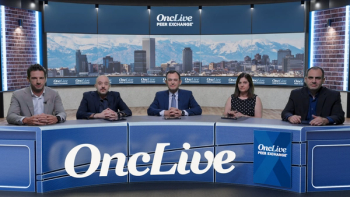
Key opinion leaders summarize their main insights and key takeaways from the EHA 2024 conference regarding advances in lower-risk myelodysplastic syndrome treatment.

The expert panel explores the future landscape of lower-risk myelodysplastic syndrome treatment, considering recent approvals and emerging clinical data.

Key opinion leaders (KOLs) examine real-world evidence and draw on their clinical experiences to inform their practice, discussing real-world dose escalations and key insights gained from practical application.

Medical professionals deliberate on patient selection criteria for second-line imetelstat treatment in lower-risk myelodysplastic syndromes, incorporating findings from the IMerge study into their considerations.

Medical experts discuss sequencing strategies for second-line and later treatments in lower-risk myelodysplastic syndromes, examining how recent data, including insights from the MEDALIST trial, influence treatment selection and sequencing decisions.

Medical experts explore alternative treatment options for lower-risk myelodysplastic syndrome (LR-MDS) patients who are not suitable candidates for first-line luspatercept therapy.

Key opinion leaders evaluate the safety profiles of available frontline treatments for patients with lower-risk myelodysplastic syndromes, including observed adverse reactions.

Medical professionals examine the utilization patterns of luspatercept in lower-risk myelodysplastic syndromes (LR-MDS) and their impact on patient treatment strategies.

Experts in lower-risk myelodysplastic syndromes analyze and interpret the comparative biomarker data on ring sideroblasts in LR-MDS patients from the COMMANDS study.

The panel examines the COMMANDS trial results, focusing on luspatercept's effects across erythroid, neutrophil, and platelet lineages and their implications for treatment decisions, while also exploring how genomic factors and mutational burden influence the drug's clinical outcomes in lower-risk myelodysplastic syndromes.

Published: August 17th 2023 | Updated:
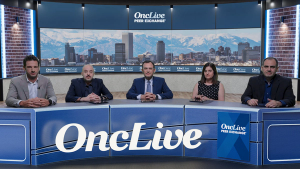
Published: July 29th 2024 | Updated:

Published: January 18th 2023 | Updated:
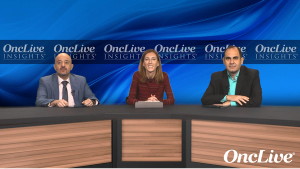
Published: January 24th 2025 | Updated:

Published: January 18th 2023 | Updated:

Published: June 29th 2022 | Updated: